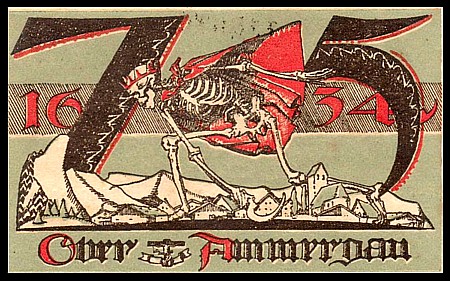GERMAN NOTGELD - Oberammergau
Passion Play of Oberammergau

In the ancient German town of Oberammergau, the citizens continue to keep an ancient promise their ancestors made to God for His ending the plague that devastated the small population.
The year was 1633, and throughout Europe, the 30 years’ war was still going strong, and would not end until 1648. Not only did the war wreak death and hardship throughout Europe, but the plague, called the Black Death due to dark patches on the skin from bleeding underneath the skin, was making one of it’s many ravages across the continent as well. In Oberamergau, a small town in southern Germany, about 60 miles from Munich, decided that they were having none of it this time. They instigated a quarantine to preserve their populace, and let no one in.
Well, the town tried to keep everyone else out, anyway. When they started the quarantine, they had to ban those who were already outside the gates, even if they were just working in another town. Such a fate happened to a man named Kaspar Schisler, who had been away from home for several months. He tried to return to his home, but found himself kept at bay by the quarantine. Anxious to see his family, Kaspar did the one thing that he could to ensure that his name would be recorded in the history books: He slipped past whatever security was in place and entered his hometown and reunited with his family. A few days later, Kaspar Schisler was dead from the plague.
Kaspar had brought the plague into the city with him. In just one year, almost 25% of the small town’s population, already suffering effects from the war, had succumbed to the dreadful disease. Out of approximately 600 people in the city, there were 80 deaths recorded in the city’s official documents. Back then, only male deaths were recorded, so it is certain that there were many wives and children who also died, but went unrecorded.There was little medical knowledge in those days, and as such, the cause of the plague was a mysterious, evil pestilence that many attributed to bad air, such as the smells of toilets, evil doings from foreigners, planetary alignments, the devil, mysterious clouds bringing the disease at night. Some even thought that God was punishing them for the evildoings of man. The people of Oberammergau had thought that whatever the cause, they should try to plead with God to stop the plague from killing their friends and families off.
One popular method of trying to win God’s favor over the plague at the time was to reenact the Passion Play, about the last days of Christ, in a show of repentance of sins and their anguish of Christ’s suffering on the Cross. The People of Oberammergau, gathering around a cross, still hanging in the church, made vow to perform the Passion Play every ten years if He would stop the devastating plague. It is said that from that very day, there were no more deaths from the plague.
The next year, 1634, they made their first performance of the Passion Play on Whitsun, the 7th Sunday after Easter. The people of Oberammergau kept their promise, and every ten years, they performed the play. In 1680 it was decided to have the performance in the first year of the decade, and it has been so ever since.
Only twice has the play been interrupted. The first one was in 1770 when, due to ‘objectionable material’ in the plays, the state placed a ban on all Passion Plays by the Ecclesiastical Council after request of the Catholic Church. Then in 1940, the play was not performed due to the effects of World War II. Extra performances were later made to compensate for these interruptions.
The play has since resumed and continues to be a major draw for tourists from around the world. However, the Corona-19 pandemic which affected the entire globe caused the play to again be postponed for 2020, but was resumed in 2022. The play has grown not only in popularity, but also in size. The last play was 8 hours long, and encompassed a theater with seating for 4,700 people, and more than 2,000 (yes, two-thousand!) actors. Actors are limited to residents of Oberammergau only. Performed 5 days a week from May through September, the next performance is expected to draw over 750,000 spectators.
